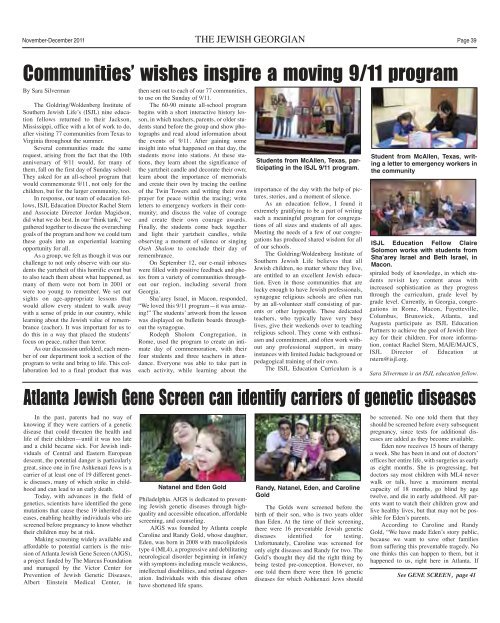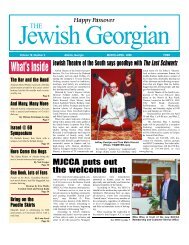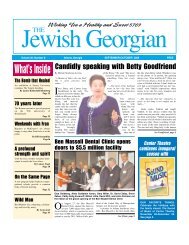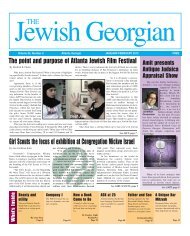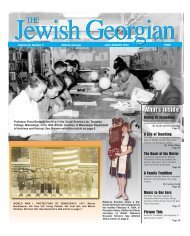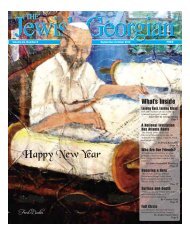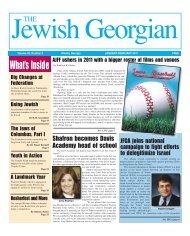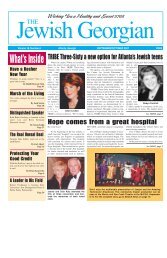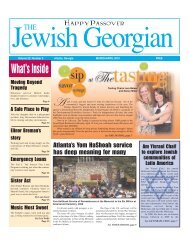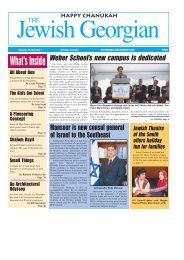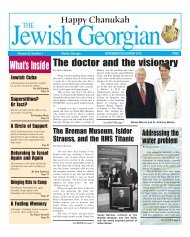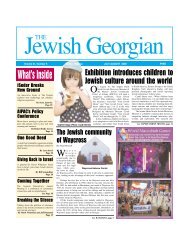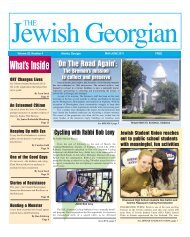Happy Chanukah - The Jewish Georgian
Happy Chanukah - The Jewish Georgian
Happy Chanukah - The Jewish Georgian
You also want an ePaper? Increase the reach of your titles
YUMPU automatically turns print PDFs into web optimized ePapers that Google loves.
November-December 2011 THE JEWISH GEORGIAN Page 39<br />
Communities’ wishes inspire a moving 9/11 program<br />
By Sara Silverman<br />
<strong>The</strong> Goldring/Woldenberg Institute of<br />
Southern <strong>Jewish</strong> Life’s (ISJL) nine education<br />
fellows returned to their Jackson,<br />
Mississippi, office with a lot of work to do,<br />
after visiting 77 communities from Texas to<br />
Virginia throughout the summer.<br />
Several communities made the same<br />
request, arising from the fact that the 10th<br />
anniversary of 9/11 would, for many of<br />
them, fall on the first day of Sunday school:<br />
<strong>The</strong>y asked for an all-school program that<br />
would commemorate 9/11, not only for the<br />
children, but for the larger community, too.<br />
In response, our team of education fellows,<br />
ISJL Education Director Rachel Stern<br />
and Associate Director Jordan Magidson,<br />
did what we do best. In our “think tank,” we<br />
gathered together to discuss the overarching<br />
goals of the program and how we could turn<br />
these goals into an experiential learning<br />
opportunity for all.<br />
As a group, we felt as though it was our<br />
challenge to not only observe with our students<br />
the yartzheit of this horrific event but<br />
to also teach them about what happened, as<br />
many of them were not born in 2001 or<br />
were too young to remember. We set our<br />
sights on age-appropriate lessons that<br />
would allow every student to walk away<br />
with a sense of pride in our country, while<br />
learning about the <strong>Jewish</strong> value of remembrance<br />
(zachor). It was important for us to<br />
do this in a way that placed the students’<br />
focus on peace, rather than terror.<br />
As our discussion unfolded, each member<br />
of our department took a section of the<br />
program to write and bring to life. This collaboration<br />
led to a final product that was<br />
In the past, parents had no way of<br />
knowing if they were carriers of a genetic<br />
disease that could threaten the health and<br />
life of their children—until it was too late<br />
and a child became sick. For <strong>Jewish</strong> individuals<br />
of Central and Eastern European<br />
descent, the potential danger is particularly<br />
great, since one in five Ashkenazi Jews is a<br />
carrier of at least one of 19 different genetic<br />
diseases, many of which strike in childhood<br />
and can lead to an early death.<br />
Today, with advances in the field of<br />
genetics, scientists have identified the gene<br />
mutations that cause these 19 inherited diseases,<br />
enabling healthy individuals who are<br />
screened before pregnancy to know whether<br />
their children may be at risk.<br />
Making screening widely available and<br />
affordable to potential carriers is the mission<br />
of Atlanta <strong>Jewish</strong> Gene Screen (AJGS),<br />
a project funded by <strong>The</strong> Marcus Foundation<br />
and managed by the Victor Center for<br />
Prevention of <strong>Jewish</strong> Genetic Diseases,<br />
Albert Einstein Medical Center, in<br />
then sent out to each of our 77 communities,<br />
to use on the Sunday of 9/11.<br />
<strong>The</strong> 60-90 minute all-school program<br />
begins with a short interactive history lesson,<br />
in which teachers, parents, or older students<br />
stand before the group and show photographs<br />
and read aloud information about<br />
the events of 9/11. After gaining some<br />
insight into what happened on that day, the<br />
students move into stations. At these stations,<br />
they learn about the significance of<br />
the yartzheit candle and decorate their own;<br />
learn about the importance of memorials<br />
and create their own by tracing the outline<br />
of the Twin Towers and writing their own<br />
prayer for peace within the tracing; write<br />
letters to emergency workers in their community;<br />
and discuss the value of courage<br />
and create their own courage awards.<br />
Finally, the students come back together<br />
and light their yartzheit candles, while<br />
observing a moment of silence or singing<br />
Oseh Shalom to conclude their day of<br />
remembrance.<br />
On September 12, our e-mail inboxes<br />
were filled with positive feedback and photos<br />
from a variety of communities throughout<br />
our region, including several from<br />
Georgia.<br />
Sha’arey Israel, in Macon, responded,<br />
“We loved this 9/11 program—it was amazing!”<br />
<strong>The</strong> students’ artwork from the lesson<br />
was displayed on bulletin boards throughout<br />
the synagogue.<br />
Rodeph Sholom Congregation, in<br />
Rome, used the program to create an intimate<br />
day of commemoration, with their<br />
four students and three teachers in attendance.<br />
Everyone was able to take part in<br />
each activity, while learning about the<br />
Philadelphia. AJGS is dedicated to preventing<br />
<strong>Jewish</strong> genetic diseases through highquality<br />
and accessible education, affordable<br />
screening, and counseling.<br />
AJGS was founded by Atlanta couple<br />
Caroline and Randy Gold, whose daughter,<br />
Eden, was born in 2008 with mucolipidosis<br />
type 4 (ML4), a progressive and debilitating<br />
neurological disorder beginning in infancy<br />
with symptoms including muscle weakness,<br />
intellectual disabilities, and retinal degeneration.<br />
Individuals with this disease often<br />
have shortened life spans.<br />
Students from McAllen, Texas, participating<br />
in the ISJL 9/11 program.<br />
importance of the day with the help of pictures,<br />
stories, and a moment of silence.<br />
As an education fellow, I found it<br />
extremely gratifying to be a part of writing<br />
such a meaningful program for congregations<br />
of all sizes and students of all ages.<br />
Meeting the needs of a few of our congregations<br />
has produced shared wisdom for all<br />
of our schools.<br />
<strong>The</strong> Goldring/Woldenberg Institute of<br />
Southern <strong>Jewish</strong> Life believes that all<br />
<strong>Jewish</strong> children, no matter where they live,<br />
are entitled to an excellent <strong>Jewish</strong> education.<br />
Even in those communities that are<br />
lucky enough to have <strong>Jewish</strong> professionals,<br />
synagogue religious schools are often run<br />
by an all-volunteer staff consisting of parents<br />
or other laypeople. <strong>The</strong>se dedicated<br />
teachers, who typically have very busy<br />
lives, give their weekends over to teaching<br />
religious school. <strong>The</strong>y come with enthusiasm<br />
and commitment, and often work without<br />
any professional support, in many<br />
instances with limited Judaic background or<br />
pedagogical training of their own.<br />
<strong>The</strong> ISJL Education Curriculum is a<br />
<strong>The</strong> Golds were screened before the<br />
birth of their son, who is two years older<br />
than Eden. At the time of their screening,<br />
there were 16 preventable <strong>Jewish</strong> genetic<br />
diseases identified for testing.<br />
Unfortunately, Caroline was screened for<br />
only eight diseases and Randy for two. <strong>The</strong><br />
Gold’s thought they did the right thing by<br />
being tested pre-conception. However, no<br />
one told them there were then 16 genetic<br />
diseases for which Ashkenazi Jews should<br />
Student from McAllen, Texas, writing<br />
a letter to emergency workers in<br />
the community<br />
ISJL Education Fellow Claire<br />
Solomon works with students from<br />
Shaʼarey Israel and Beth Israel, in<br />
Macon.<br />
spiraled body of knowledge, in which students<br />
revisit key content areas with<br />
increased sophistication as they progress<br />
through the curriculum, grade level by<br />
grade level. Currently, in Georgia, congregations<br />
in Rome, Macon, Fayetteville,<br />
Columbus, Brunswick, Atlanta, and<br />
Augusta participate as ISJL Education<br />
Partners to achieve the goal of <strong>Jewish</strong> literacy<br />
for their children. For more information,<br />
contact Rachel Stern, MAJE/MAJCS,<br />
ISJL Director of Education at<br />
rstern@isjl.org.<br />
Sara Silverman is an ISJL education fellow.<br />
Atlanta <strong>Jewish</strong> Gene Screen can identify carriers of genetic diseases<br />
Natanel and Eden Gold Randy, Natanel, Eden, and Caroline<br />
Gold<br />
be screened. No one told them that they<br />
should be screened before every subsequent<br />
pregnancy, since tests for additional diseases<br />
are added as they become available.<br />
Eden now receives 15 hours of therapy<br />
a week. She has been in and out of doctors’<br />
offices her entire life, with surgeries as early<br />
as eight months. She is progressing, but<br />
doctors say most children with ML4 never<br />
walk or talk, have a maximum mental<br />
capacity of 18 months, go blind by age<br />
twelve, and die in early adulthood. All parents<br />
want to watch their children grow and<br />
live healthy lives, but that may not be possible<br />
for Eden’s parents.<br />
According to Caroline and Randy<br />
Gold, “We have made Eden’s story public,<br />
because we want to save other families<br />
from suffering this preventable tragedy. No<br />
one thinks this can happen to them, but it<br />
happened to us, right here in Atlanta. If<br />
See GENE SCREEN, page 41


